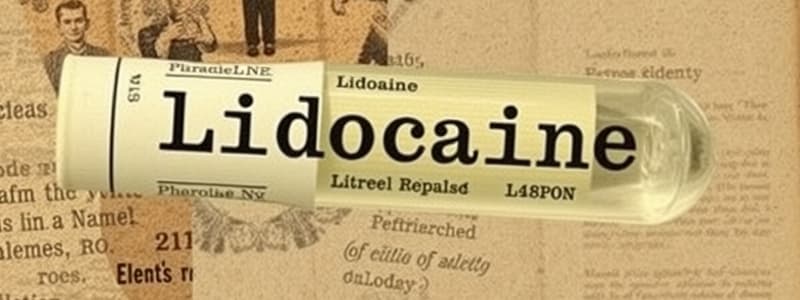Podcast
Questions and Answers
What is the brand name of Lidocaine?
What is the brand name of Lidocaine?
- Lidoderm
- Aspirin
- Novocain
- Xylocaine (correct)
What is the classification of Lidocaine?
What is the classification of Lidocaine?
Antiarrhythmic
What is the action of Lidocaine?
What is the action of Lidocaine?
Block sodium channels, increases recovery period after repolarization, suppresses automaticity and depolarization of ventricles
What are the indications for using Lidocaine?
What are the indications for using Lidocaine?
What are the contraindications for Lidocaine?
What are the contraindications for Lidocaine?
What are the possible side effects of Lidocaine?
What are the possible side effects of Lidocaine?
Lidocaine dosage for adults in cardiac arrest is ___ mg/kg IV/IO to a max of ___ mg/kg.
Lidocaine dosage for adults in cardiac arrest is ___ mg/kg IV/IO to a max of ___ mg/kg.
What is the pediatric dosage for Lidocaine?
What is the pediatric dosage for Lidocaine?
Flashcards are hidden until you start studying
Study Notes
Lidocaine Overview
- Brand name: Xylocaine
Classification
- Classified as an antiarrhythmic medication.
Mechanism of Action
- Blocks sodium channels to stabilize cardiac membranes.
- Increases recovery period after repolarization.
- Suppresses automaticity and depolarization of ventricles.
Indications
- Used for ventricular arrhythmias, particularly when Amiodarone is unavailable.
- Effective in cardiac arrest scenarios, especially for ventricular fibrillation (V-Fib) and ventricular tachycardia (V-Tach).
Contraindications
- Contraindicated in patients with atrioventricular (AV) block.
- Avoid use in conditions like Adams-Stokes Syndrome and Wolff-Parkinson-White Syndrome.
Side Effects
- Potential side effects include toxicity and seizures.
- Risk of cardiac arrhythmias, hypotension, and cardiac arrest.
Dosage Guidelines
- Adults: In cardiac arrest, administer 1.0-1.5 mg/kg IV/IO, maximum of 3.0 mg/kg; second dose of 0.5-0.75 mg/kg.
- Continuous drip rate should be between 1-4 mg/min.
- For perfusion ventricular tachycardia (VT), administer 0.5-0.75 mg IV/IO with a maintenance infusion of 1-4 mg/min.
- Pediatrics: 1 mg/kg, with a maximum dosage of 100 mg; infusion rate of 20-50 mcg/kg/min.
Studying That Suits You
Use AI to generate personalized quizzes and flashcards to suit your learning preferences.



